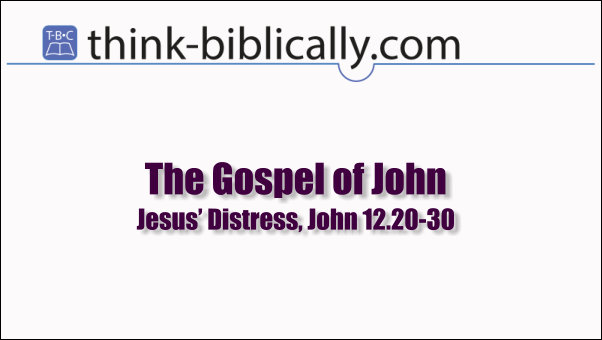By Tyson Thorne

Today's passage doesn't present much in the way of new material and is confusing due to constantly shifting topics, so we're going to do our best to unravel this ball of string and make it easy to understand. By way of example, in verse 20 it states that some Greeks had gone "up" (meaning to Jerusalem) to worship at the feast (Passover). Who are these Greeks? They are new to the story and, as we'll see, not particularly important. Because John calls them Greeks, they are probably "God-fearers" (people who worship Elohim but are not a part of the Jewish nation).
These Greeks were familiar with Jesus and the disciples, enough so that they recognized Philip and asked him if they could have an audience with Jesus. This is the end of the story for the Greeks, because after Philip left and found Andrew and the two of them found Jesus, the Messiah was already engaged in teaching a crowd of people. There is no telling what happened to the God-fearers after Philip left them. "All Greeks, exit stage left please".
It's not until verse 29 we learn that there is a crowd around Jesus and that he isn't speaking only to Philip and Andrew. The pair do find Jesus and probably whisper to him that the Greeks would like to talk to him. I picture him nodding and continuing to teach the crowd saying, "The time has come for the Son of Man to be glorified." Today we understand that Jesus was talking about himself, and his death and resurrection. Then, the crowd wasn't sure to make of it. Knowing this, Jesus launches into two stories, each with the same point.
The first story is about a kernel of corn. A single kernel does nothing on its own. It is not a living thing. Yet if it should fall to the ground it can produce more kernels. Through a singular, lonely death more just like it are created. The second story is about a person. No name is given, it is just a hypothetical person with two possible futures. If he loves his life more than he does God, then he will lose both. On the other hand, if he loves God more than his own life both are secured. The man who chooses his own life is like a dead kernel of corn. The man who chooses God is a planted kernel that brings about new life.
With an understanding of Jesus' first statement, he continues this topic saying that a servant of the Christ will follow the Christ, even unto death. For wherever Jesus goes, the servant will be also. For this, he will be honored by the Father.
Jesus opens up to the crowd, "Now my soul is greatly distressed," he begins. A question is raised at the crucifixion; one of the soldiers states, "Let God save him if he truly is the Son of God." Jesus is pre-empting this argument with his next words: " And what should I say? ‘Father, deliver me from this hour’? No, but for this very reason I have come to this hour. Father, glorify your name.” Then something miraculous happens.
I mentioned in the introduction that there isn't much in the way of new material in this passage, and I meant it. When Jesus was baptized by John the Baptist God's voice rang from heaven, audible to all who were present. So when God speaks again it isn't new, but it is startling due to its infrequency. It is described here differently, however. Some thought it like the sound of thunder, but others knew it to be a voice — and understood its statement — though they didn't know who had spoken. These details, while interesting, are not as important as what the voice said.
"I have glorified it," God said, "and I will glorify it again." The word "it" is not supplied in the Greek text and this is not unusual. Often direct objects are omitted when the context makes it clear. Since the context is clear, I'm surprised by the translators choice of "it" as opposed to "My Son" or "the Messiah."
"This voice has not come for my benefit," Jesus explains (verse 30) — and for good reason. It could have been understood that God had spoken to bring peace to Jesus' distress. No, God spoke for the benefit of the people so that they might understand the resurrection.
